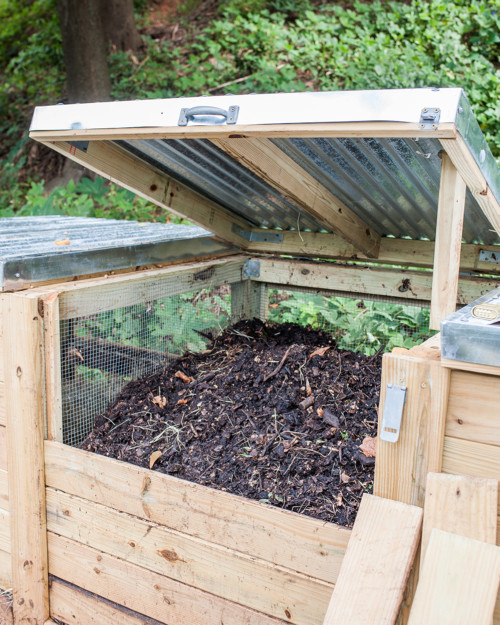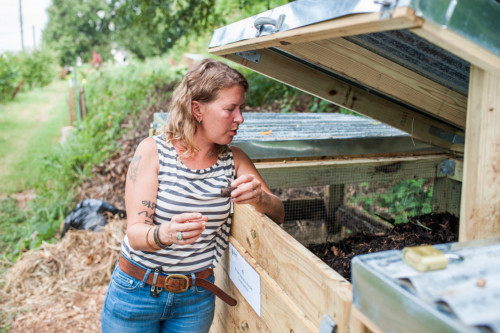
How Terra Nova Is Combatting Systemic Injustice With Compost
“If we don’t build our soil, we can’t grow food, maintain farms, or feed people!” Corinne Coe, the founder of Terra Nova Compost, explains. “Soil is critical to our survival.”
Based out of Atlanta, Terra Nova Compost is a compost education and consulting organization with social justice at its heart. Along with many other organizations, Terra Nova Compost is working towards a more just and equitable food system– but unlike others, Terra Nova Compost’s approach is quite literally from the ground down. As “Atlanta’s Compost Queen,” Coe spreads the message that composting is an activity for everyone. “Compost is a part of more than a few systems (or cycles: carbon, water, food, for example) that we all are or should be a part of,” Coe maintains.
“To me that’s the crux of the metaphor of composting: creating something valuable, useful, meaningful, beautiful, out of what many people consider waste.”
Like the local food movement before it, the compost wave is poised to disrupt one of America’s largest– and often unseen– industries: waste management. In the United States, landfills alone are a $52 billion dollar industry, and in states where land is inexpensive, it’s often cheaper to simply dump waste in a remote location, where it can be forgotten. Compost, on the other hand, proposes a self-benefitting system.
Unfortunately, compost isn’t always a simple matter of dropping off food scraps. In more progressive states like California, New York, or Vermont, there are more progressive or innovative rules for composting. But in Georgia– a state with cheap land and conservative leanings (though urban areas, like many populous cities across the country, tend to be more liberal)– composting faces strict, often prohibitive regulations. (The power of the waste industry lobby is hardly a new story.) Primarily, these regulations restrict community level, “medium scale” composting, whose practitioners often struggle to meet legal requirements designed for large scale composting sites. While backyard, “small scale” composting is protected, many people are intimated by what they imagine is a long and arduous undertaking– which is where Coe comes in.
“One of the things I tell my students is, ‘Look, I don’t care if you are super enthusiastic about composting, build a three-bin system, go looking for feedstocks to build active, thermophilic piles, or you are lazy about it and just throw your scraps in a backyard pile and forget about it. But you must do it. We have to compost,'” Coe emphasizes. “There are folks that really push for big facilities, some push for the middle, some think only backyard composting will save the world… [but] I’m all for composting at every scale.”
As if proof of concept, Coe’s clients at Terra Nova Compost range across ages and demographics, from wealthy Atlanta suburbanites, to small skincare entrepreneurs trying to start composting in a local community garden, to non-profits, community agencies, and even farmers.
Reflecting on the challenges of compost, Coe explains: “Farming and food are the better-known parts of the agriculture cycle—and they’re more agreeable to most people than ‘dirt’– which isn’t soil or compost, of course, contrary to popular belief. Everyone loves fresh tomatoes, but few people get excited about rotting food. I think once people make compost, their attitude changes– ‘I know it, I’ve seen it!’ And, ‘It happened to me!'”
“My purpose is social justice, healthy soil, healthy people, and a healthy planet, and compost is my method,” Coe reiterates. “Studies show that it’s the poor and already vulnerable who do and will suffer most from climate change. And we know that it is the poor who are hungry. I’m not of the opinion that feeding people will end hunger. Hunger is a political issue, there’s no shortage of food… When I first made compost from start to finish many years ago, I was literally transformed by that experience. Seeing that I created something out of what people consider waste. To me that’s the crux of the metaphor of composting: creating something valuable, useful, meaningful, beautiful, out of what a lot people consider a waste, or secondary, or unimportant.
“Everyone can compost because it doesn’t have to cost anything! At small and small-medium scale, it’s only additive, it’s only beneficial,” Coe says, “And getting dirty is good for us! Science says so!”



































